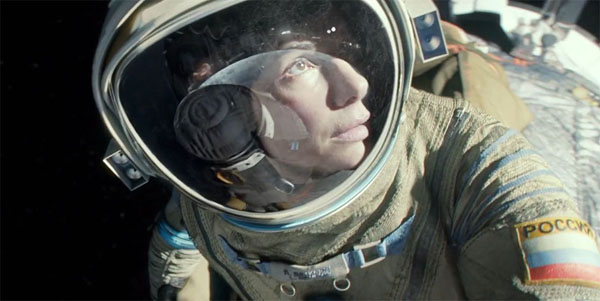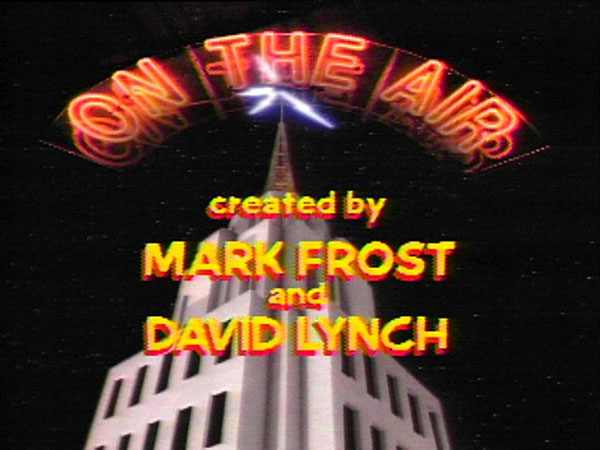The 70th Venice International Film Festival will open on August 28 with the world premiere of Alfonso Cuarón’s highly anticipated Gravity. The “heart-pounding thriller that pulls you into the infinite and unforgiving realm of deep space,” as the festival gleefully puts it, will screen Out of Competition, in 3D, and it’s hard to imagine that stars George Clooney and Sandra Bullock won’t be there. Venice 2013 runs through September 7.
Reading. You might start with a screenplay. In 1979, Orson Welles and Oja Kodar collaborated on a screenplay based on two stories by Karen Blixen, “The Dreamers” and “Echoes.” Henry Jaglom, whose lunchtime conversations with Welles years later would become one of the most talked about books of this summer, sought financing and found some from Hal Ashby’s production company. Welles shot around 20 minutes of The Dreamers before funding dried up. Cinephilia and Beyond has the complete screenplay.
Ready for more Allan Dwan? R. Emmet Sweeney has caught over 20 of his films during MoMA’s ongoing retrospective and, at Movie Morlocks, he begins his survey. Part 1 focuses primarily (but not exclusively) on Dwan’s “assertive female characters” and his “ease with female power,” and in particular, his work with Gloria Swanson. “Dwan draws out her rambunctious comedienne, pushing her down the social ladder, from costume drama clotheshorse to working class striver. Dwan called the glamorous diva ‘a clown if there ever was one’ and lets her loose as a destructive force upon the city. Swanson would later call Dwan her favorite director because of it.”
The Act of Killing, currently screening in the UK, remains one of the most unique and powerful films in years, and Sight & Sound is running the uncut version of Nick Bradshaw‘s interview with director Joshua Oppenheimer: “You can’t go into a situation where a million people have been killed and people are celebrating it, and come out clean—unless you lie about it, or about your position. If you want to look at the most important questions—what is the nature of this regime? How do we do this to each other? Okay, these men are boasting about what they’ve done: why and to what end? And what are the effects on the whole society, first and foremost, and on them personally?—you can’t remain pure and clean, because it’s a terrible situation you’ve waded into and you’re getting very close to it.”
At Twitch, Brian Clark translates highlights from Olivier Séguret‘s Libération report on his visit to the set of Godard‘s Adieu au langage.
“History, the saying goes, is written by the victors. Yet in most of the most popular movies about the Civil War, the Confederacy held the rooting interest.” Time‘s Richard Corliss cites, naturally, D.W. Griffith’s The Birth of a Nation (1915), Buster Keaton’s The General (1926), and David O. Selznick‘s Gone with the Wind (1939) before getting around to his point that “any serious depiction of the Battle of Gettysburg, which lasted from July 1st to 3rd, 1863—150 years ago this week—would carry the rude shock of a face slap into reality.” Which may be why it’s been all but ignored on screen.
John McElwee looks back to the days of the first VCRs, when 130-minute blank tapes cost around $20 and you’d stay up all night recording and live-editing a 2 a.m. broadcast. Hitchcock’s Rebecca (1940) “gave suspense beyond story values for being 130 minutes on the nose with doubt as to whether one tape would hold it. I got to moments before the end title and fritz-out, OK despite that because this was Rebecca and now she was mine. I’d spent two-and-a-half hours pausing precise on commercial breaks and felt at the end as though Everest itself had been scaled.”
“What if the dude who gave us Mulholland Drive, Twin Peaks, and Blue Velvet wrote a sitcom?” asks Ramsey Ess at Splitsider. “And then it aired on ABC in 1992? Meet On the Air.” Not only can you watch the pilot of David Lynch and Mark Frost’s half-hour comedy, but Ess also explains why only three of the seven episodes produced ever aired in the States.
Designer Sam Smith, who’s done some very fine work for Janus Films, Criterion, and Nashville’s Belcourt Theatre, talks with Lee Reedy and Robert Clayton about the posters they designed for Janus’s theatrical releases in the late ’60’s and early ’70’s, back when their award-winning company was called Dot Graphics. Lots of great eye candy at Criterion’s Current.
It’s Harry Dean Stanton Day at DC’s.
In other news. As he departs for Dissolve, Matt Singer welcomes Sam Adams as the new editor and head writer at Criticwire.
Book. “Alex Espinoza’s second novel, The Five Acts of Diego Léon, explores the journey of a peasant Mexican boy who leaves Mexico during the Mexican Revolution and comes to Hollywood to make it as a Latin Lover in second-rate pictures.” A qualified recommendation from Josefina Lopez in the Los Angeles Review of Books.
Lists. They bring the traffic, so summertime best-of-the-year-so-far lists are evidently going to be a thing. Following Indiewire‘s, we’ve got another from the Film Society of Lincoln Center. And once again, Richard Linklater‘s Before Midnight comes out on top, as it should.
At Twitch, James Marsh picks his top eleven Asian films of 2013—again, so far.
And then there are 50 American films, one for each state, mapped and blurbed in Time Out New York.
New York. Big Star: Nothing Can Hurt Me, opening today at the IFC Center, gathers “a multigenerational extended family of Memphis scenesters, musicians, artists, critics, and biological family members, all of whom have some connection to Big Star, thereby revealing the energy field that generated and nurtured the band through all its disappointments.” At Artforum, Andrew Hultkrans recommends catching it.
Karlovy Vary. Ioncinema‘s Eric Lavallee is all over the ongoing International Film Festival.
In the works. “While [David O.] Russell is still gliding on the popularity of last year’s Silver Linings Playbook, which has turned him into an activist for the mental health community, he’s also got a new feature slated for awards season fervor,” writes Eric Kohn, introducing an interview at Indiewire: “American Hustle, currently in post-production and scheduled for a December release, revolves around the seventies-era exploits of Mel Weinberg (Christian Bale), a real life financial con man, his British partner in crime (Amy Adams), and the FBI agent who exploits them (Bradley Cooper).”
“DreamWorks is in talks with the estate of author John Steinbeck to make a new version of The Grapes of Wrath,” reports Deadline‘s Mike Fleming Jr., noting that Fox still owns the foreign rights to John Ford‘s 1940 adaptation. Steven Spielberg would produce but not direct this new version.
Hungary’s Prime Minister Viktor Orban may be a thorn in the side of Europe, but the country’s come through for György Pálfi, as Twitch‘s Todd Brown reports: “Toldi‘s 5.4 million Euro budget is roughly five times what is typical for the nation and he’s going to need it to tell the story of Miklos Toldi, a historical figure elevated to the level of folk hero in the epic poems of Janos Arany and viewed now as a sort of local Robin Hood figure with superheroic overtones.”
“Filming on director Michael Mann’s new thriller Cyber is taking place in Hong Kong. The Heat helmer and Thor star Chris Hemsworth, along with Chinese actress Tang Wei (Lust, Caution) and Taiwanese actor Wang Leehom (Little Big Soldier), are partaking in all-night shoots in the heart of the territory, Central, and tourist spot Temple Street.” Karen Chu has more in the Hollywood Reporter.
Marcia Gay Harden, Jacki Weaver, Eileen Atkins, Hamish Linklater, Simon McBurney, Erica Leerhsen, and Jeremy Shamos are joining Colin Firth and Emma Stone in Woody Allen’s next film, reports Madeline Raynor at Indiewire.
James Franco’s told the Los Angeles Times that he aims to follow As I Lay Dying with another Faulkner adaptation, The Sound and the Fury. The AV Club‘s Sean O’Neal has details.
Principle photography has begun on Maximilian Erlenwein’s thriller Stereo, starring Jürgen Vogel and Moritz Bleibtreu, reports Birgit Heidsiek in Cineuropa.
Obit. This is going to be the third entry to mention the passing of Lau Kar-leung (see the first and second), but David Bordwell‘s appreciation cannot, of course, go overlooked. Lau “was one of the best filmmakers of the 1970s and 1980s,” writes Bordwell and, after arguing the case, he revisits a scene from Tiger on the Beat (1988), which he originally analyzed in 2011.
Bordwell: “Yes, it’s over the top. Yes, it employs Hong Kong Physics…. It’s not realistic, but it knocks you upside the head. You either laugh or gape, but you can’t say you felt nothing. Stylization, in other words, is one path to powerful expression, and even exhilaration. Nobody understood that better than Lau Kar-leung.”
Meantime, Sean Gilman‘s just posted an entry on Lau’s Dirty Ho (1976).
For news and tips throughout the day every day, follow @KeyframeDaily on Twitter and/or the RSS feed. Get Keyframe Daily in your inbox by signing in at fandor.com/daily.





